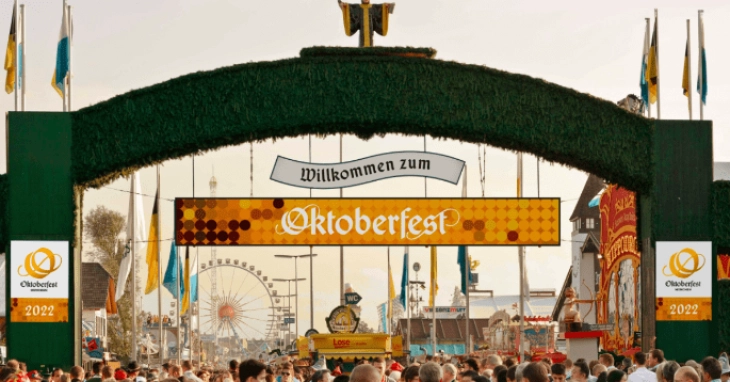Long queues, chilly drizzle, mark return of Oktoberfest to Munich

Munich, 17 September 2022 (dpa/MIA) - Long queues and low temperatures marked the return of Oktoberfest to Munich on Saturday, after a two-year pause due to coronavirus restrictions.
Although the festivities didn't officially start until noon (1000 GMT), when Munich Mayor Dieter Reiter tapped the first keg, and the fairgrounds didn't open until 9 am, people started lining up well before the sun rose, many people freezing in temperatures around 10 degrees Celsius while wearing traditional leather shorts, or Lederhosen (for men) or dirndls, a traditional dress for women.
Nor did the lines go away. First people lined up to get into the best tents when the grounds opened, even if no beer was to be served for several hours. Then, when the beer started flowing, people without reservations stood waiting outside the more popular tents.
However, there were reports that many of the people waiting had found their own sources of alcohol before the events started, with many people in the various lines visibly drunk.
That said, medical personnel said they had yet to find anyone passed out from excess beer consumption, a condition strikingly referred to as being a "beer corpse" (Bierleiche) by the local helpers. By 1 pm, they said they had only reported a handful of minor injuries, despite medical crews having CT scans on hand for the first time this year.
Now it remains to be seen how the party will go.
With the pandemic not yet over, however, and fears of an autumn and winter wave of infections rife in Germany, Reiter admits the mood is not the same as it was pre-pandemic. Additionally, the impact of high energy prices and inflation weighing heavily on the minds of would-be revellers.
Nonetheless, "I'm happy that many thousands of people are happy," said the mayor.
Lead organizer Clemens Baumgärtner has predicted the 2022 festival, known locally as the "Wiesn," could be better attended than the last one in 2019. "The Wiesnlust and anticipation are enormous," he said.
Along with the beer, the festival pours barrels of cash into the local coffers.
"We are very happy when it starts. It's about time we had a Wiesn again," said Peter Inselkammer, a spokesperson for the city's bar owners.
About 6 million guests would come each year before the coronavirus hit, about one in five of them from abroad.
Even if the pandemic is not over, people will party again as they always have: without restrictions, close together in the tents.
These plans have predictably invited controversy.
"Of course, it will lead to an increase in the number of cases," said Johannes Bogner, head of the Clinical Infectiology Section at the University of Munich.
Munich's former mayor, who at 74 years old is from a high-risk group, announced that he won't be there for the opening ceremony.
The coronavirus question has already led to a minor Twitter spat between Bavarian Premier Markus Söder and Federal Health Minister Karl Lauterbach.
While conservative politician Söder said that "the coronavirus situation is currently stable" and that he'll be there without a mask, Social Democrat Lauterbach has urged people to test before joining the crowds.
Lauterbach's warnings were "overwrought," Söder said. Lauterbach countered that he didn't want to be a "party pooper" and that he simply wanted people to act responsibly.
As the Oktoberfest opened, Söder said he remained confident that Bavaria's hospitals will be able to handle any surge in cases. Lauterbach urged people to be careful, but he said it was no longer irresponsible to have a party like this, given testing and vaccination rates.
The Oktoberfest runs through October 3.







